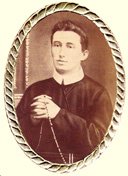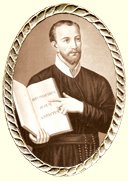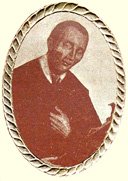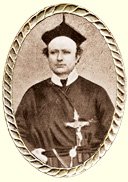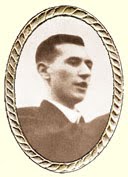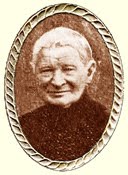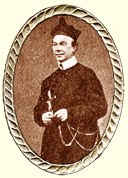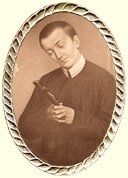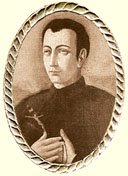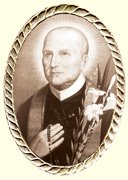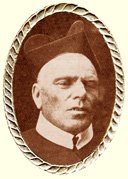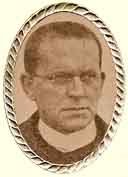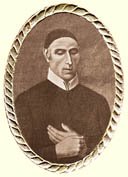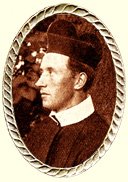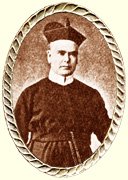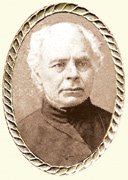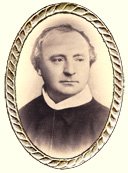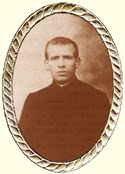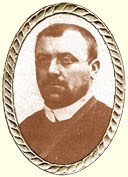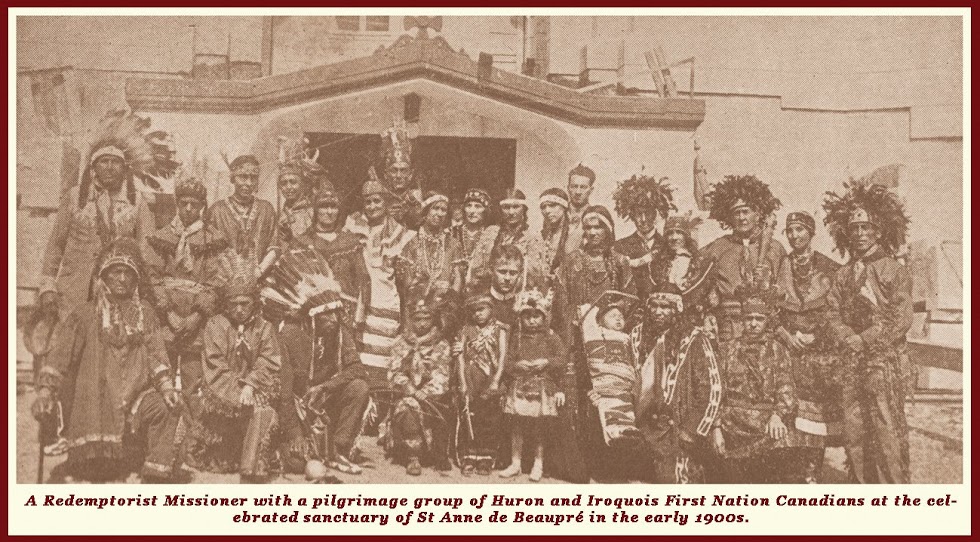Rev. Fr Walter Lambert, C.SS.R. (1818-1903)
 Fr Walter Lambert was born at Ballygillane, Tagoat, in 1818. At an early age he entered St. Peter’s College, Wexford, and afterwards went to Maynooth in 1834. He was ordained in 1848 by the Most Rev. Dr. Keating, and soon after was appointed curate in Taghmon with his uncle, Father Scallan, who was then a very old man. In 1851 he went to Cushinstown.
Fr Walter Lambert was born at Ballygillane, Tagoat, in 1818. At an early age he entered St. Peter’s College, Wexford, and afterwards went to Maynooth in 1834. He was ordained in 1848 by the Most Rev. Dr. Keating, and soon after was appointed curate in Taghmon with his uncle, Father Scallan, who was then a very old man. In 1851 he went to Cushinstown.
From the beginning he was full of religious zeal. He established in Cushinstown, what was then unknown in any part of the diocese in rural churches, confessions every morning, and Benediction of the Blessed Sacrament on Sundays. In 1853 he went to Annacurra and remained there four years, often preaching in the open air in the adjoining graveyard to overflowing congregations. On his departure from this parish, the people, as a token of their affection, presented him with an expensive watch—a gift considered rare in those days. In 1857 he was transferred to Gorey, but remained there only for one year. Father Kirk, who is a convert, but was at one time a protestant clergyman in Gorey, refers to Father Lambert in a little book of personal reminiscences:
“Among those who were good enough to call and see me was the Rev. Father Larnbert, head curate of the parish. He was in every way a very remarkable man; his influence among his parishioners was irresistible. He had a summary way of putting an end to incipient disorders. In one particular case, hearing that some men were taking too much drink and beginning to be disorderly in a publichouse, he suddenly appeared among them, and deeming force on such occasions better than persuasion, without saying a word he put his arm on the table and swept all the glasses and liquor on to the floor, and walked out of the room, leaving them to pay the cost.”
After a year in Gorey, on the opening of the two parochial churches in Wexford, by the late Canon Roche in 1858, Father Lainbert was sent to him as curate. He laboured in Wexford from this time until he joined the Congregation of the Most Holy Redeemer in 1875, a period of seventeen years, when, in order to prevent a public demonstration of the people’s affection, he left secretly for Bishop Eton, near Liverpool, to make his novitiate. What Wexford owes to the ministrations of Father Lambert it would be hard to exaggerate. His toil was incessant. He was the guide and friend of all, in temporal, as well as in spiritual affairs.
When he left Wexford he was penniless. His all had gone to the needy, to the sick and dying poor, whom he visited frequently and knew intimately. He was untiring in the performance of offices of mercy and charity, of which few, save those directly benefited, were ever aware.
He laboured with great patience and determination to reform drunkards, and to rid the town of many vices. But the poor he made his particular charge, and when Wexford was visited with distress, it was not only when the poor cried out in their anguish for relief that Father Lambert was active; he acted spontaneously and unasked. He knew the wants of the poor, for he was a frequent visitor at their homes, and when no longer able to provide for their wants himself, he was never slow to seek the aid of those who could afford to share their comforts with the needy. He was in the truest and noblest sense, Wexford’s benefactor. For, like the late Canon Doyle and the race of Priests who were his contemporaries, he belonged to the best and truest Priests that the country has produced.
He entered upon the work of the mission in the midst of the famine, when he beheld scenes that no pen can adequately describe, scenes, the horrors of which, later generations cannot realise.
During his life as a secular priest not alone did he devote himself to the routine work of a curate, but his services were sought and were never refused in numberless matters outside the definite sphere of daily duties. He established, and was first Spiritual Director of the Holy Family in Wexford. He also founded, and was first director of the Clothing Society. In times of severe weather he was the first to come forward to raise funds to supply the poor with coal and other material comforts.
Of his public career it may be remarked that as his love for his country and its people was genuine and ardent; he did not shrink from advocating their cause on any occasion in which he could render them a service. He was a most steadfast and determined man and no influence could make him swerve an iota from the opinions which he honestly held.
Before speaking of his life as a Redemptorist, it may be mentioned that Father Lambert’s piety led him, in the year 1870, to make a pilgrimage to the Holy Land. In after life he used to relate many most edifying and interesting anecdotes of this pilgrimage.
About twenty-eight years ago, when fifty-seven years old, he entered the Congregation. It might naturally have been supposed that a man of fifty-seven would be too old to enter on an entirely new career, and that, even if he did attempt this his life in a new sphere could be but short. But Father Lambert was no ordinary man. As a secular Priest he had gone through three trying periods of cholera and only the strongest constitution could have survived the work in which his sacred ministry constantly engaged him during those times. He was now about to submit his iron constitution to the wearing life of a missionary.
For many years he had felt the call to leave all for the love of God. At length, with great difficulty, he procured the permission of his Superiors to go to South Africa, in order to work there on the secular mission, where Priests were few and the Catholic population widely scattered. His books had already been sent on before him. Suddenly, and no doubt by an all wise disposition of Divine Providence, circumstances induced Father Lambert to change his plans. Instead of going on board the steamer for South Africa, he entered the Redemptorist Novitiate at Bishop Eton. This change of intention is very remarkable, for, as has already been said, he was a man not of a fickle disposition, but of iron resolution. He did change his mind however, and his novitiate began.
His Novice Master was Father Ziereis, a native of Bavaria. He was a strict disciplinarian and tried his new novice severely. There are many stories told of that Novitiate; a feature that shines out, in all these is, what one may call the joyous boyishness of this novice of fifty-seven years. Father Lambert had been his own master up to this time. Now he had to give up his own ways even in the smallest and most trifling matters. A few weeks before, he had been the idol of Wexford, looked up to by all, wielding as much power as any man in that town; now he kneels down when corrected by his Novice Master and associates and goes out to walk with young boy-novices. It was necessary for him to mould his life to the Redemptorist model, a thing which may be comparatively easy for one called to the Congregation in his youth, but which must have cost a man of Father Lambert’s age heroic self-denial. But Father Lambert had evidently counted the cost. He persevered, and in due time was professed.
Then began his wonderful missionary career of twenty-seven years, during which he preached in many places in Ireland, England, and Scotland. He was stationed for a long time in Clapham, London, where the Redemptorists have a large parish. Here he was very popular and had considerable influence over many. As part of the duties of parish work he had frequently to attend to “sick calls” by night.
At this time he gave many missions in London and in other parts of England. In these missions his labours, as may be expected, were mostly among his own people, and he used to go about, as is the custom, from house to house seeking the lost sheep of the House of Israel. Often did it happen that, when he called at the house of some Irish exiles, who had got on well in England, the door was slammed in his face, and he was rudely told that they would hear no mention of the mission or of religion.
During all his Redemptorist life he laboured unceasingly in the sacred tribunal of penance. On the English missions he often heard confessions almost until midnight, and would be again at work soon after five o’clock the next morning.
In Ireland he gave missions in most parts of the country. It was always with genuine pleasure that he visited his beloved native country, and the good people of Wexford were equally glad to see the kindly face of dear old Father Lambert.
During the twenty-seven years of his life as a missionary he often spent almost eight months of the year in giving missions. His order of the day on mission was, uniformly, as follows: He rose before five o’clock each morning; as soon as meditation was finished, at six o’clock, he went directly to his confessional; here he remained, always surrounded by numerous penitents, until the hour came for him to offer up Holy Mass; after Mass and Thanksgiving he took breakfast, for this he allowed very little time, and when breakfast could be given in the sacristy he would gladly take it there. It was his invariable rule to return immediately after breakfast to hear confessions once more; after this he would not leave the confessional until four o’clock in the afternoon. He always took his turn in giving the morning instructions and in preaching the evening sermons. Such was his mission life until three months before his death.
In Community life Father Lambert was full of playful mirth and fun. Up to the end he had the buoyant spirits of a young man; this trait in his character, together with a kindly nature, caused him to be much beloved by his confreres.
Father Lambert had above all the spirit of a priest of Jesus Christ. He had ever had, as he himself declared on his death bed, an abiding fear of offending God. This reverential fear ruled his life. His obedience was most remarkable. He was at times placed under Superiors who were not, perhaps, half his age, and yet their least word was as a law to him. He was by nature affectionate, and in his friendships most faithful, especially in those which he had formed in his youth. He had a great love also for our holy Rule and for its regular observance. Of this regular observance he was himself a model. He rose every morning with the Community, and made his half-hour’s morning meditation on his knees. This he observed until two days before his death.
For the last few months of his life he was suffering from cateract on his eyes. He had already lost the use of one, and the other had become very dim. Glasses proved useless on account of his advanced age, yet, though he had been dispensed from the obligation, he persevered in reading the Divine Office up to the end.
In the September of 1902 he gave a mission of three weeks duration in Kilmore, county Wexford, a parish situated near the one in which he was born. This was the last but one of his apostolic works. In October he gave a retreat in the Cathedral of Waterford, and this closed his long missionary career.
He seemed to enjoy his usual health during the three months that followed. Towards the end of January, however, he caught a chill, which brought on a slight attack of influenza. This occurred on Tuesday. On Wednesday and Thursday there seemed to be no immediate danger. Following, however, the prudent advice of Doctor Malone, Father Lambert asked for the last Sacraments. He was anointed at six o’clock in the evening, and received the Holy Viaticum at a quarter past ten at night. Then, too, the last Blessing was administered. During all this time he was calm and by no means weak. He answered all the prayers aloud. After the last Blessing had been given, Father Rector said to him: “Now, Father Lambert, you have received Our Divine Lord and His Blessing for a happy death; for a little while, quietly raise your heart to God in prayer.” Thereupon, the dear old man prayed aloud in a most fervent and touching way: “Oh, my God,” he said, “many souls have I prepared for death, and now I am myself prepared! Many a confession have I heard, many a soul have I directed; oh, may God grant that none of these may be lost through my fault! Oh, Jesus, have mercy on me, and when I appear before Thee grant me a favourable judgment!” These are some of the touching prayers that fell from his lips. It was now hall-past ten. He was not in pain. He seemed still to have much strength, yet after a little while he began to sink rapidly. He died calmly about midnight.
On Saturday, 31st January, the remains of Father Lambert, after the Solemn Requiem, sung by Father Rector in presence of his Lordship the Bishop of Limerick, were laid to rest in the vaults beneath the high altar. †




















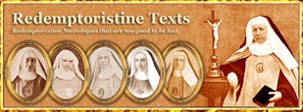
.jpg)









